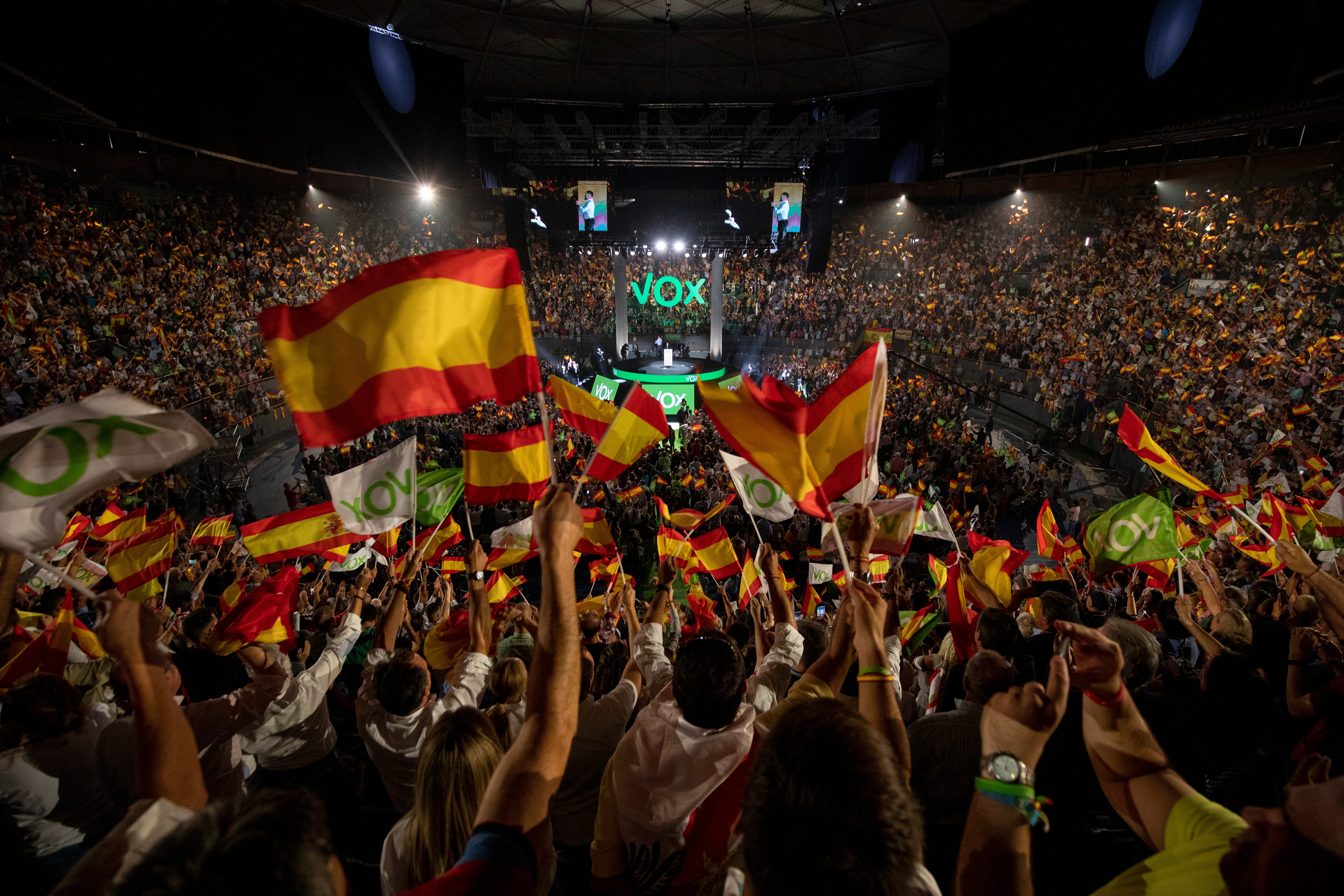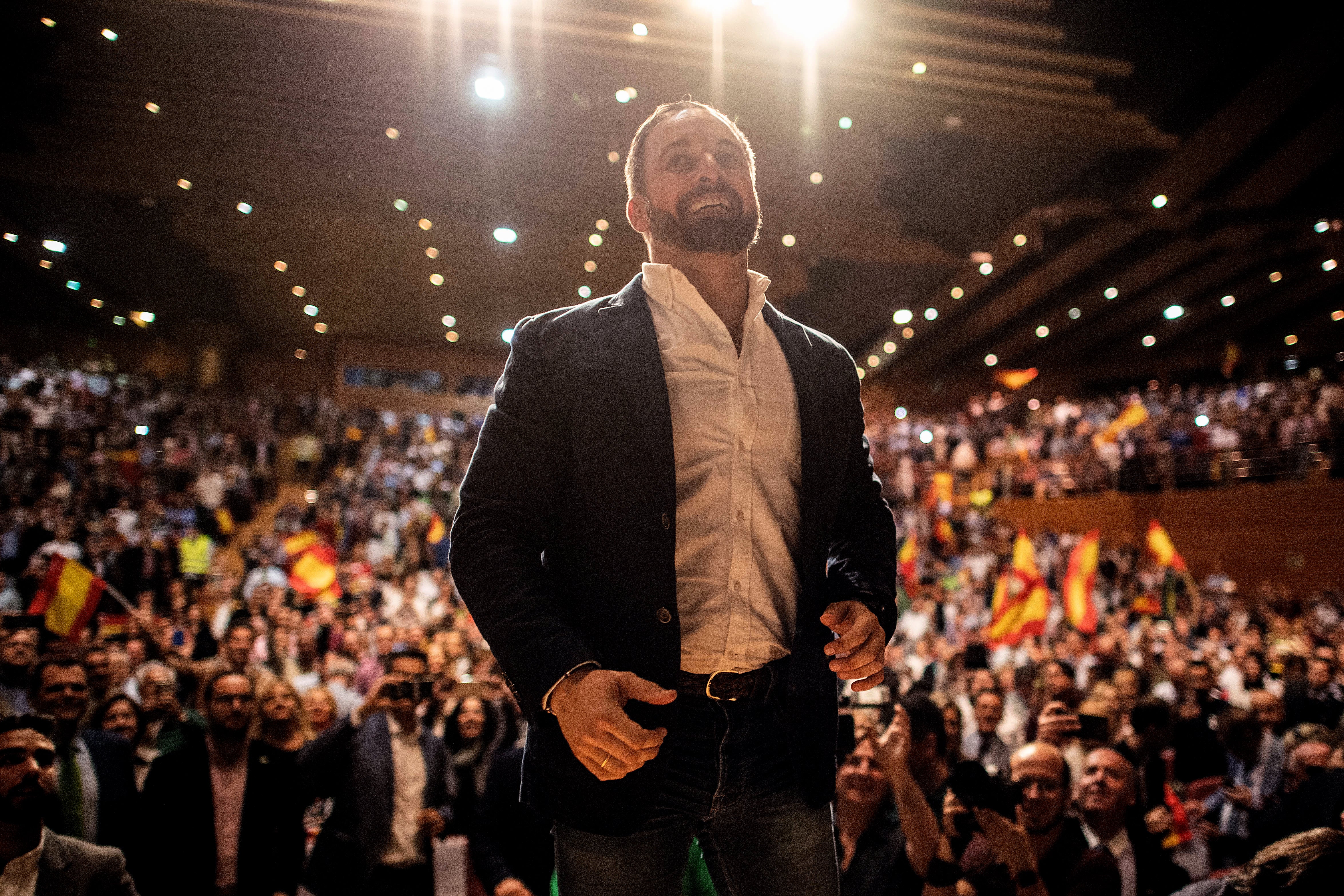Half a century after burying Franco and fascism, Spain turns again to the far right
With the country going to the ballot box next month, polls indicate Vox could be the latest in a series of far-right parties in ascendancy across Europe, writes Graham Keeley


Home to the Costa Blanca, Valencia is best known for Spain’s signature dish paella, but this week gained fame of a different kind.
Spain’s eastern region witnessed an alliance between the conservative People’s Party (PP) and the far-right Vox party, which would then go on to take power in coalition with the PP in 10 cities on Saturday in the wake of local elections last month. It is an alliance which could be repeated after a snap general election in July.
Polls suggest the PP is favourite to win at the polls but will only be able to assume power with the help of kingmaker Vox.
Jose Maria Llanos, the head of Vox in Valencia, provided an illustration of the type of rhetoric we can expect from the party when he insisted “gender violence does not exist”.
Alberto Nunez Fejoo, the PP leader who tries to cultivate a moderate image, immediately sought to distance himself, tweeting: “Gender violence does exist.”
“The PP will not take a step backwards in the fight against this scourge,” he added.
Only five years ago Vox was in the political wasteland but now it could soon be helping call the shots in the Eurozone’s fourth-biggest economy.
Vox, like the Law and Justice party in Poland and the Brothers of Italy which governs in Rome, could be the latest in a series of far-right parties in the ascendancy in Europe.
Spain may be poised to usher in a return of the hard right, almost half a century after the death in 1975 of the fascist General Francisco Franco after a long dictatorship.
The socialist prime minister Pedro Sanchez called snap elections after his ruling left-wing coalition went into meltdown at local and regional elections on 28 May.

Sanchez called the election in an attempt to outsmart the PP and Vox, who were the winners at the ballot box in local elections.
The Spanish prime minister is gambling that he can both consolidate votes on the left, while also highlighting the risk that the next government would probably include the far right if the PP won most votes at the national level.
The PP won few absolute majorities in local or regional governments so will have to rely on Vox to govern in a number of municipalities. Vox performed well, increasing its share of the vote from 3.6 per cent in 2019 to 7.6 per cent in 2023.
Sanchez has warned that letting Vox in the back door will turn Spain into a version of the Trump-era United States or the populist era of former president Jair Bolsonaro in Brazil.
US president Joe Biden unseated Trump after one term and Brazilian president Luiz Inacio Lula da Silva beat Bolsonaro in last year’s election.
“Spain is not immune to this reactionary trend, but in Spain we can stop it, for our sons and daughters,” Sanchez told socialist lawmakers last week, urging Spaniards to decide whether “they want a prime minister on the side of Biden or Trump, on the side of Lula or Bolsonaro”.
Alberto Nunez Feijoo, the PP leader, is from Galicia, a rainy region in northwest Spain whose people are famous for being indecisive. You can’t tell if they are going up the stairs or down, goes the well-worn saying.
So far, he has either not made up his mind about doing a deal with Vox post the general election or does not want to say.
Feijoo said last week he would seek an absolute majority and avoided answering questions about any potential alliance with the far right.
A moderate conservative, he has tried to steer the party to the political centre-ground after previous PP prime ministers took a more hawkish tone.

Feijoo, who is taking English lessons in readiness for attending international conferences if he becomes prime minister, speaks Galician. This endears him – up to a point – to Basque and Catalan nationalists.
He has tried to project a softer tone towards Catalonia, conceding mistakes were made in the past, a reference to a previous conservative government which sent hundreds of police to break up an illegal Catalan independence referendum five years ago.
However, analysts believe the reality is that the conservative leader will have no choice but to cut a deal with Vox if, as expected, he fails to win a majority at the general election.
So, who are Vox?
Ten years ago they were formed by Santiago Abascal, the party leader and a former PP councillor who became disillusioned with the party of which he was a member because of its drift to the political centre-ground and a spate of corruption scandals.
He holds a licence for a Smith & Wesson revolver to protect him as he lived in the Basque Country which was at that time racked by the threat of Eta terrorism. These days Abascal likes to portray himself as a serious politician.
At first sight, Ignacio Garriga Vaz de Concicao, Vox’s secretary general, seems an unlikely rising star of a far-right party which, opponents say, is hell-bent on ridding Spain of immigrants.
For a start, his mother emigrated to Barcelona in 1958 from Equatorial Guinea, then Spain’s only colony in sub-Saharan Africa.
No shaven-headed hard-right radical, Garriga is in person a mild-mannered dentist and father of four.
Garriga hails from Vox 2.0.

In 2016, his predecessor as Vox secretary general, Javier Ortega Smith, single-handedly tried to invade Gibraltar and reclaim it for Spain by spreading a huge gold and red flag in the British overseas territory. He escaped by swimming away from the Rock.
Analysts believe Vox is entering a new phase: it is moving on from being a party of protest, which came to prominence because of opposition to the Catalan independence push – an event that caused the biggest crisis in Spanish politics for decades.
Garriga insists that Vox is changing from a party of protest to one of “maturity”.
“We have the capacity to help decide up to six regional governments. The problem is everyone has a different position. The leader in each region has a different position and so does Feijoo,” he told The Independent.
“Of course, we are prepared to do a deal so that we can change politics and put an end to the era of Sanchez.”
Garriga insists Vox is ready for government, and tax cuts would be the first measure if it won the election in July.
“Sanchez has led a campaign of fear,” he said. “The more that he demonised us, the more Spaniards are attracted to us. He is just hiding the reality.”
Garriga said Vox wants to “defend the frontiers of Europe” and the “sovereignty of Spain”.
“We want to protect ourselves from illegal immigration and to protect our sovereignty,” he said.
“Lots of media manipulate our message. We are against illegal immigration. We are in favour of labour from abroad. If this comes legally, obviously we are in favour.”
Vox has said it would reform the European Union, but it has not made this a cornerstone of policy as Spain has always been a pro-Europe country.
With retired generals and bullfighters among its members, the party backs stronger police and ridding the education system of what Garriga called “activists who indoctrinate our children”.
The party would overturn the so-called “trans law”, which was introduced by the present government in February, which allowed gender self-determination from the age of 16 without the need for psychological or medical evaluation.
Vox would also rein in separatism in Catalonia and the Basque Country and back a centralised state.
Sanchez has adopted a measured tone between Madrid and Catalan independence parties which has meant support for separatism has dropped.
To gauge what Spain might be like if Sanchez’s nightmare scenario comes true and the PP and Vox rule in coalition, recent events in Castile and Leon may give a hint.
The first coalition in Spain between the two right-wing parties was formed in February last year after elections in the northern region.
Last week, hundreds of angry farmers stormed government buildings, smashing windows with sticks, after a row over a plan to relax European Union rules on bovine tuberculosis.
Police charged the protesters in Salamanca, an elegant university city in northern Spain more used to partying and dining out. Eleven officers were hurt and one farmer was arrested.
The chaos made national news because Vox first proposed easing rules on a disease which farmers claim is threatening their livelihood.
The plan was swiftly dropped after pressure from the Spanish government and Brussels which have strict rules to control the disease, but the farmers rioted in protest.
In January this year, Spain became embroiled in a row over abortion rights after the Castile and Leon government proposed restrictions.
Under the new measures, Vox suggested women seeking abortions would be granted the chance to listen to the foetus’s heartbeat, have a 4D ultrasound scan – designed to show foetal movement – and get psychological advice, all aimed at reducing abortions.
After the Spanish government threatened legal action for breaching women’s right to abortion, which is enshrined in law, it was dropped.
“What Vox have done since they joined the government is to create problems. These are mainly problems for the PP,” said a government official in Valladolid, the seat of regional government, who did not want to be named.
“This could give a clear idea of how any PP-Vox government might be in the future. There has been a lot of tension.”
Despite their bogeyman status, some right-wing Spaniards have accepted the possibility of Vox playing a role in government, said Lluis Orriols, a political analyst from Carlos III University in Madrid.
“It is also likely that if Vox plays a role in the government it will prompt a return of separatism in Catalonia,” he said in an interview with The Independent.
Cas Mudde, an expert in extremism and author of The Ideology of the Extreme Right, said Vox would not present a threat to liberal democracies in Europe.
“First of all, Vox will be a junior partner and will be largely beholden to the PP, particularly in terms of foreign policy,” he told The Independent.
“Secondly, Vox is in the European Conservative and Reformists group, with the Polish Law and Justice party and the Brothers of Italy, among others, parties that are in power and are largely accepted by the European Union, particularly because they are anti-Putin.”
Join our commenting forum
Join thought-provoking conversations, follow other Independent readers and see their replies
Comments
Bookmark popover
Removed from bookmarks